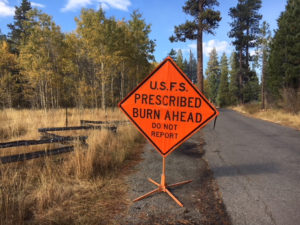Tahoe Fire & Fuels Team to begin Tahoe Basin fall prescribed fire program
September 23rd, 2019PRESS RELEASE
Tahoe Fire and Fuels Team
September 23, 2019
Tahoe Fire & Fuels Team to begin Tahoe Basin fall prescribed fire program
Contact: USDA Forest Service, Lisa Herron (530) 543-2815
LAKE TAHOE, Calif./Nev. – The Lake Tahoe Basin Fall Prescribed Fire Program may begin as early as September 24, 2019, under the management of the Tahoe Fire & Fuels Team (TFFT), which includes local, state and federal fire and land management agencies. Weather and conditions permitting, California State Park crews may begin prescribed fire operations in Burton Creek State Park near Tahoe City and in a couple of weeks move to D.L. Bliss State Park near Tahoma. Smoke will likely be present. A map with project locations and details is available for viewing at tahoe.livingwithfire.info/get-informed/ (scroll down to view map). To receive email prescribed fire notifications, send a request to pa_ltbmu@fs.fed.us and you will be added to the Prescribed Fire Notification List.
“Above 6,000 feet at Lake Tahoe, the forest fuel moisture and weather conditions may allow for burning in late September,” said Rich Adams, California State Parks Forester II. “In addition to the environmental conditions, current wildfire activity and availability of standby firefighters are always part of the decision to initiate prescribed burning.”
Prescribed fire managers use different methods to reintroduce fire back into our forests that include pile burning and understory burning. Pile burning is intended to remove excess fuels (branches, limbs and stumps) that can feed unwanted wildfires and involves burning slash piles that are constructed by hand and mechanical equipment. Understory burning is low intensity prescribed fire that takes place on the ground (the understory) rather than pile burning. Understory burning uses a controlled application of fire to remove excess vegetation under specific environmental conditions that allow fire to be confined to a predetermined area. Understory burning produces fire behavior and fire characteristics required to attain planned fire and resource management objectives.
Fall and winter bring cooler temperatures and precipitation, which are ideal for conducting prescribed fire operations. Each operation follows a specialized prescribed fire burn plan, which considers temperature, humidity, wind, moisture of the vegetation, and conditions for the dispersal of smoke. All of this information is used to decide when and where to burn.
Smoke from prescribed fire operations is normal and may continue for several days after an ignition depending on the project size and environmental conditions. Prescribed fire smoke is generally less intense and of much shorter duration than smoke produced by wildland fires.
“Prescribed fire is an important part of restoring forest resilience,” said USFS Forest Supervisor, Jeff Marsolais. “We recognize smoke can be an impact to some community members once fire is on the ground, but the importance of removing excess vegetation now, before a catastrophic fire, cannot be understated.”
Agencies coordinate closely with local, county and state air pollution control districts and monitor weather conditions carefully prior to prescribed fire ignitions. They wait for favorable conditions that will carry smoke up and disperse it away from sensitive areas. Crews also conduct test burns before igniting a larger area, to verify how effectively materials are consumed and how smoke will travel.
Before prescribed fire operations are conducted, agencies post road signs around areas affected by prescribed fire, send email notifications and update the local fire information line maintained by the USDA Forest Service at 530-543-2816. The TFFT gives as much advance notice as possible before burning, but some operations may be conducted on short notice due to the small window of opportunity to conduct these operations.
Please keep in mind that residential burning on private property in the Tahoe Basin is currently suspended. For information about private land fire restrictions in California, which are regulated by the California Department of Forestry and Fire Protection (CALFIRE), visit www.calfire.ca.gov. For information about private land fire restrictions in Nevada, which are regulated by North Lake Tahoe and Tahoe Douglas fire protection districts, visit www.tahoefire.org/ or www.nltfpd.net/. To learn more about the benefits prescribed fire, visit tahoe.livingwithfire.info/getinformed/understanding-fire/.
About the Tahoe Fire and Fuels Team
The Tahoe Fire and Fuels Team (TFFT) consists of representatives of Tahoe Basin fire agencies, CAL FIRE, Nevada Division of Forestry and related state agencies, University of California and Nevada Cooperative Extensions, the Tahoe Regional Planning Agency, the USDA Forest Service, conservation districts from both states, the California Tahoe Conservancy and the Lahontan Regional Water Quality Control Board. Our Mission is to protect lives, property and the environment within the Lake Tahoe Basin from wildfire by implementing prioritized fuels reduction projects and engaging the public in becoming a Fire Adapted Community.
For more information, visit tahoe.livingwithfire.info/about/

